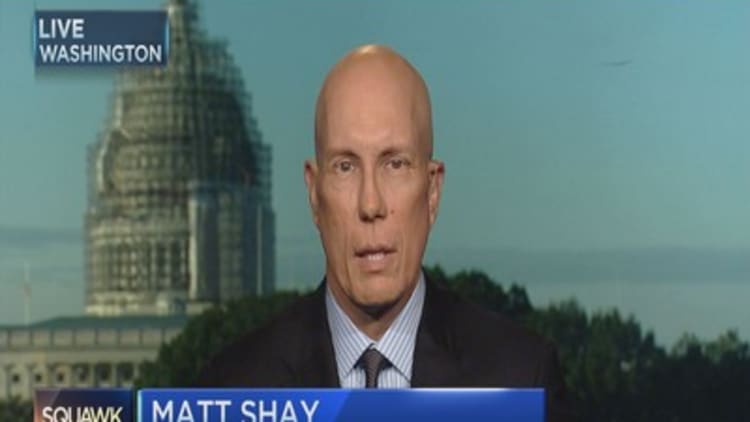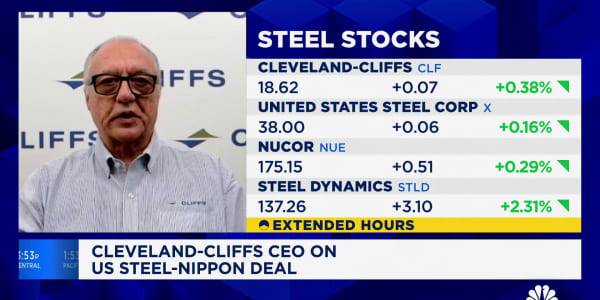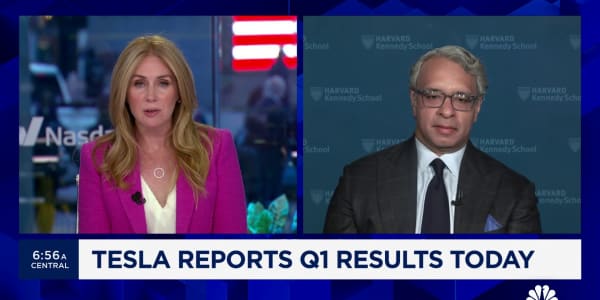
Americans are not spending much of the money they're saving at the pump.
Some benefit in home prices and employment have come to areas with long commutes, but effects on retail spending have been "more ambiguous," according to an analysis from Goldman Sachs economists.
"Our view has been that the boost to real incomes from lower energy prices—and its positive impact on consumer spending—would offset the drag from energy-related investment, resulting in gains for US GDP growth on net," Hui Shan and Zach Pandl said in their report. "While consumer spending has picked up since Q1, results for the year so far have fallen short of our expectations."
Indeed, retail spending has been disappointing despite expectations for a rejuvenated U.S. economy boosted by the decline in oil prices. Crude tumbled 55 percent and gasoline dropped 42 percent from June 2014 to January 2015. The decline in both has abated since then, but prices at the pump are still 30 percent lower than they were a year ago, according to AAA.
In a study that looked at U.S. regions where at least 80 percent of workers commute, Goldman found uneven results: Improving labor markets and declines in mortgage delinquency, but not enough to translate to substantial retail spending gains on a national level.
The reason lies primarily in the beneficiaries: Less wealthy people likely used the savings to pay down debt and add to savings, with only the wealthy spending.
"County and ZIP code level data suggest that areas with long commute times—which benefit disproportionally from lower gasoline prices—have experienced a boost in their labor and housing markets relative to other locations," Shan and Pandl wrote. "We therefore see evidence that consumers are responding to cheaper gasoline, and in our view a portion of this extra spending power remains in the tank."
Read MoreHere's where everyone's going on vacation this summer
How much is still "in the tank" will be critical toward the arc of U.S. growth.
Gross domestic product fell well short of expectations in the first quarter, contracting 0.2 percent. Economists blamed the slowdown on poor weather and the West Coast port strike, though a recent paper from the New York Federal Reserve found the latter event to have only a modest drag on growth. GDP, however, is on track for 3 percent gains in the subsequent two quarters, according to the CNBC/Moody's Analytics Current Quarter GDP Survey.
That upswing may have to come without as much help as expected from consumers. The National Retail Federation cut its full-year sales growth expectations Wednesday from 4.1 percent to 3.5 percent, due to what NRF president and CEO Matthew Shay deemed "lackluster growth in our economy."
Read More That oil glut is turning into a glut at the pump
Relief at the gas pump has been offset by pressures elsewhere.
Hourly wages are growing at just 2 percent annually and real wages, accounting for inflation, actually declined 0.3 percent in June, according to the Labor Department.
Prices also have surged in several areas, most notably on eggs, which rose 31 percent in June just in a month, thanks to an avian flu outbreak in chickens. Wine jumped 20 percent, beer was up more than 5 percent and gasoline rose more than 2 percent, according to the Bureau of Labor Statistics.
In recent research, Nick Colas, chief market strategist at Convergex who keeps a lookout for consumer trends, found a strong correlation between the fall in gas prices, miles driven and employment trends. In a nutshell, he surmised that the lower prices were resulting in more driving, primarily to work.
"At the tail end of last year, most economists were dead sure that lower gasoline prices would spark a wave of incremental spending, as most periods of declining energy prices had in the past. Makes sense—less money at the pump means more money to spend elsewhere," Colas wrote. "Except this mystery turned into something more akin to the 'Hound of the Baskervilles,' where the central clue was the absence of a barking dog. As is now painfully obvious, the American consumer took their gas savings, bypassed the mall, and just went home."






